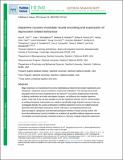| dc.contributor.author | Tye, Kay | |
| dc.contributor.author | Mirzabekov, Julie J. | |
| dc.contributor.author | Warden, Melissa R. | |
| dc.contributor.author | Ferenczi, Emily A. | |
| dc.contributor.author | Tsai, Hsing-Chen | |
| dc.contributor.author | Finkelstein, Joel | |
| dc.contributor.author | Kim, Sung-Yon | |
| dc.contributor.author | Adhikari, Avishek | |
| dc.contributor.author | Thompson, Kimberly R. | |
| dc.contributor.author | Andalman, Aaron S. | |
| dc.contributor.author | Gunaydin, Lisa A. | |
| dc.contributor.author | Witten, Ilana B. | |
| dc.contributor.author | Deisseroth, Karl | |
| dc.date.accessioned | 2015-01-15T19:40:10Z | |
| dc.date.available | 2015-01-15T19:40:10Z | |
| dc.date.issued | 2012-12 | |
| dc.date.submitted | 2012-05 | |
| dc.identifier.issn | 0028-0836 | |
| dc.identifier.issn | 1476-4687 | |
| dc.identifier.uri | http://hdl.handle.net/1721.1/92905 | |
| dc.description.abstract | Major depression is characterized by diverse debilitating symptoms that include hopelessness and anhedonia1. Dopamine neurons involved in reward and motivation are among many neural populations that have been hypothesized to be relevant, and certain antidepressant treatments, including medications and brain stimulation therapies, can influence the complex dopamine system. Until now it has not been possible to test this hypothesis directly, even in animal models, as existing therapeutic interventions are unable to specifically target dopamine neurons. Here we investigated directly the causal contributions of defined dopamine neurons to multidimensional depression-like phenotypes induced by chronic mild stress, by integrating behavioural, pharmacological, optogenetic and electrophysiological methods in freely moving rodents. We found that bidirectional control (inhibition or excitation) of specified midbrain dopamine neurons immediately and bidirectionally modulates (induces or relieves) multiple independent depression symptoms caused by chronic stress. By probing the circuit implementation of these effects, we observed that optogenetic recruitment of these dopamine neurons potently alters the neural encoding of depression-related behaviours in the downstream nucleus accumbens of freely moving rodents, suggesting that processes affecting depression symptoms may involve alterations in the neural encoding of action in limbic circuitry. | en_US |
| dc.language.iso | en_US | |
| dc.publisher | Nature Publishing Group | en_US |
| dc.relation.isversionof | http://dx.doi.org/10.1038/nature11740 | en_US |
| dc.rights | Article is made available in accordance with the publisher's policy and may be subject to US copyright law. Please refer to the publisher's site for terms of use. | en_US |
| dc.source | PMC | en_US |
| dc.title | Dopamine neurons modulate neural encoding and expression of depression-related behaviour | en_US |
| dc.type | Article | en_US |
| dc.identifier.citation | Tye, Kay M., Julie J. Mirzabekov, Melissa R. Warden, Emily A. Ferenczi, Hsing-Chen Tsai, Joel Finkelstein, Sung-Yon Kim, et al. “Dopamine Neurons Modulate Neural Encoding and Expression of Depression-Related Behaviour.” Nature 493, no. 7433 (December 12, 2012): 537–541. | en_US |
| dc.contributor.department | Massachusetts Institute of Technology. Department of Brain and Cognitive Sciences | en_US |
| dc.contributor.department | Picower Institute for Learning and Memory | en_US |
| dc.contributor.mitauthor | Tye, Kay | en_US |
| dc.relation.journal | Nature | en_US |
| dc.eprint.version | Author's final manuscript | en_US |
| dc.type.uri | http://purl.org/eprint/type/JournalArticle | en_US |
| eprint.status | http://purl.org/eprint/status/PeerReviewed | en_US |
| dspace.orderedauthors | Tye, Kay M.; Mirzabekov, Julie J.; Warden, Melissa R.; Ferenczi, Emily A.; Tsai, Hsing-Chen; Finkelstein, Joel; Kim, Sung-Yon; Adhikari, Avishek; Thompson, Kimberly R.; Andalman, Aaron S.; Gunaydin, Lisa A.; Witten, Ilana B.; Deisseroth, Karl | en_US |
| mit.license | PUBLISHER_POLICY | en_US |
| mit.metadata.status | Complete | |
